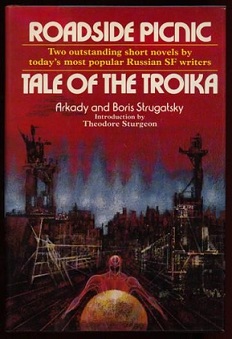
Russian writers seem to have a special talent for highlighting the grimness and misery of ordinary life. Roadside Picnic, a novella by the brothers Arkady and Boris Strugatsky, is a fine example of how this morosity shows up even in science-fiction. Computer gaming fans will know this novella, first published in 1972, as the ultimate inspiration for the STALKER series of games, albeit by way of the film version directed by Andrei Tarkovsky that was released in 1979.
Naturally, the original novella differs markedly from the video game. The novella for example is set in the fictional town of Harmont in some unnamed Commonwealth country, instead of the area around the Chernobyl reactor in Ukraine. This in turn is only one of six zones scattered around the global that were created by the alien visitation event. Still, many themes and even individual elements, such as how the stalkers use throw bolts to detect the boundaries of some types of anomalies, will be recognizable to STALKER fans.
For those who are completely unfamiliar with the premise and don’t mind reading a minor spoiler, the title Roadside Picnic itself refers to a metaphor used to understand the visitation event. Some time in the 1970s, aliens seemingly arrive at six points around the planet. Yet the aliens are never seen. Instead, strange events happen at these places to mark the visit: explosions, strange noises, plagues, etc. After the visit itself was over, anomalous phenomena remained at these sites. In some places, the buildings, cars and other objects never decay, as if shielded from the effects of time. In other spots, gravity is so magnified as to instantly crush anyone who passes through the area into a pulp. Even the inhabitants of these areas who survived the event become cursed in a bizarre manner. If they move away from the zone, misfortune follows them, causing the people who interact with them to die from bizarre accidents.
Eventually, the authorities quarantine off these zones, using deadly force when necessary to ensure that no one strays into the affected areas. But still, people come, attracted by the artifacts that may be harvested from the zones. These artifacts come in all sizes and shapes and are given names by the stalkers, the adventurers who brave the authorities and the dangers of the zone to harvest them. Black Sprays for example, refer to bead-like objects that seem to absorb and then re-emit light after a period of time, though some light is always lost inside the bead for some unknown reason. The so-so is a round, black stick that seems to provide endless energy and can be used to power vehicles. An empty is pair of flat discs with empty space between them, yet the two discs will always maintain a fixed distance between them as if they were a single solid object even if other objects are placed within the space.
One scientist therefore calls the visitation a roadside picnic by aliens so far advanced ahead of us that we might as well be forest animals compared to humans. For whatever inscrutable reasons, the aliens chose to briefly stop by Earth while on their way to somewhere else and all these anomalies and artifacts that they left behind are simply the garbage that they left behind, much as humans might leave unfinished food, empty packaging, broken equipment, engine oil etc. in the forest after a picnic of their own.
The novella focuses on the life of one particular stalker, Redrick Schuhart, who operates in Harmont. In a series of episodic stories that check in on Schuhart’s life around a span of about ten years, the reader sees how the the horrors of the zone wears him and the people around him down. We see how the zone is so deadly that every time someone makes it out of there alive, he is feted as a hero. We see how his friends and colleagues die or are maimed by the dangers of the zone. And we see how the almost unfathomable power of the artifacts corrupts men so that they are willing to perform unspeakable deeds to obtain them.
Roadside Picnic, rising from near obscurity, is now considered a classic of the genre and the reason is obvious. While its premise is original and sets fire to the imagination, the real draw of the story comes from its powerful portrayal of the misery of the lives of the people who have formed an attachment to the zone, and for good or ill reasons, can never leave again.